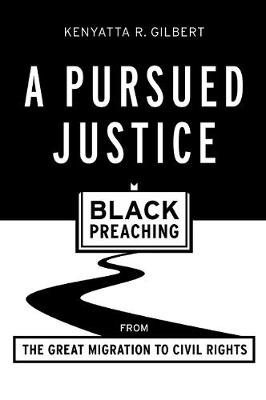
A Pursued Justice
Black Preaching from the Great Migration to Civil Rights
Seiten
2017
Baylor University Press (Verlag)
978-1-4813-0399-6 (ISBN)
Baylor University Press (Verlag)
978-1-4813-0399-6 (ISBN)
The narrative of Civil Rights often begins with the prophetic figure of Martin Luther King Jr in the 1960s. In A Pursued Justice, Kenyatta Gilbert instead traces the roots of King's call for justice to African American prophetic preaching that arose in an earlier moment of American history.
The narrative of Civil Rights often begins with the prophetic figure of Martin Luther King Jr. in the 1960s. City squares became a church, the body politic a congregation, and sermons a jeremiad of social change - or so the story goes. In A Pursued Justice, Kenyatta Gilbert instead traces the roots of King's call for justice to African American prophetic preaching that arose in an earlier moment of American history.
In the wake of a failed Reconstruction period, widespread agricultural depression, and the rise of Jim Crow laws, and triggered by America's entry into World War I, a flood of southern Blacks moveÔÇïd from the South to the ÔÇïurban centers of the North. This Great Migration transformed northern Black churches and produced a new mode of preaching - prophetic Black preaching - which sought to address this brand new context.
Black clerics such as Baptist pastor Reverend Adam Clayton Powell Sr., A.M.E. Bishop Reverdy Cassius Ransom, and A.M.E. Zion pastor Reverend Florence Spearing Randolph rose up within these congregations. From their pulpits, these pastors ""spoke truth to power"" for hope across racial, ethnic, and class lines both within their congregations and between the Black community and the wider culture.
A Pursued Justice profiles these three ecclesiastically inventive clerics of the first half of the twentieth century whose strident voices gave birth to a distinctive form of prophetic preaching. Their radical sermonic response to injustice and suffering, both in and out of the Black church, not only captured the imaginations of participants in the largest internal mass migration in American history but also inspired the homiletical vision of Martin Luther King Jr. and subsequent generations of preachers of revolutionary hope and holy disobedience.
The narrative of Civil Rights often begins with the prophetic figure of Martin Luther King Jr. in the 1960s. City squares became a church, the body politic a congregation, and sermons a jeremiad of social change - or so the story goes. In A Pursued Justice, Kenyatta Gilbert instead traces the roots of King's call for justice to African American prophetic preaching that arose in an earlier moment of American history.
In the wake of a failed Reconstruction period, widespread agricultural depression, and the rise of Jim Crow laws, and triggered by America's entry into World War I, a flood of southern Blacks moveÔÇïd from the South to the ÔÇïurban centers of the North. This Great Migration transformed northern Black churches and produced a new mode of preaching - prophetic Black preaching - which sought to address this brand new context.
Black clerics such as Baptist pastor Reverend Adam Clayton Powell Sr., A.M.E. Bishop Reverdy Cassius Ransom, and A.M.E. Zion pastor Reverend Florence Spearing Randolph rose up within these congregations. From their pulpits, these pastors ""spoke truth to power"" for hope across racial, ethnic, and class lines both within their congregations and between the Black community and the wider culture.
A Pursued Justice profiles these three ecclesiastically inventive clerics of the first half of the twentieth century whose strident voices gave birth to a distinctive form of prophetic preaching. Their radical sermonic response to injustice and suffering, both in and out of the Black church, not only captured the imaginations of participants in the largest internal mass migration in American history but also inspired the homiletical vision of Martin Luther King Jr. and subsequent generations of preachers of revolutionary hope and holy disobedience.
Kenyatta R. Gilbert is Associate Professor of Homiletics at Howard University School of Divinity.
Preface
Acknowledgments
Introduction: The Migration of Hope
Part 1
1. The Exodus: History and Voices of the Great Migration
2. The Promised Land: Social Crisis and the Importance of Black Preaching
Part 2
3. Preaching as Exodus: Prophetic Imagination, Praxis, and Aesthetics
4. Exodus Preaching: Gospel and Migration
5. Exodus as Civil Rights: King and Beyond
Conclusion: Petitionary Truth Telling
Appendix A. Chapter 4 Sermons
Appendix B. Chapter 5 Sermons
Notes
Bibliography
Index
| Erscheinungsdatum | 22.02.2017 |
|---|---|
| Verlagsort | Waco |
| Sprache | englisch |
| Maße | 152 x 229 mm |
| Themenwelt | Geschichte ► Teilgebiete der Geschichte ► Religionsgeschichte |
| Religion / Theologie ► Christentum ► Kirchengeschichte | |
| Religion / Theologie ► Christentum ► Liturgik / Homiletik | |
| Religion / Theologie ► Christentum ► Moraltheologie / Sozialethik | |
| Religion / Theologie ► Christentum ► Pastoraltheologie | |
| Sozialwissenschaften ► Ethnologie | |
| Sozialwissenschaften ► Soziologie | |
| ISBN-10 | 1-4813-0399-6 / 1481303996 |
| ISBN-13 | 978-1-4813-0399-6 / 9781481303996 |
| Zustand | Neuware |
| Haben Sie eine Frage zum Produkt? |
Mehr entdecken
aus dem Bereich
aus dem Bereich
Herkunft, Blüte, Weg nach Osten
Buch | Hardcover (2024)
C.H.Beck (Verlag)
39,00 €
Von den Anfängen bis zur Gegenwart
Buch | Hardcover (2022)
C.H.Beck (Verlag)
34,00 €
warum die Religionen erst im Mittelalter entstanden sind
Buch | Hardcover (2024)
C.H.Beck (Verlag)
38,00 €


